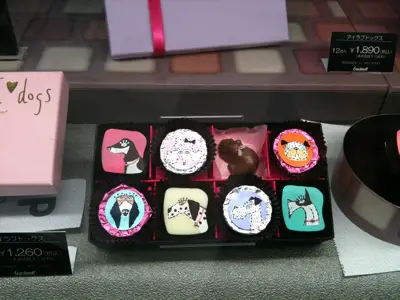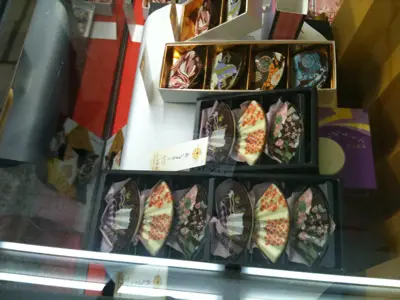
:maggie-small: 「今年も義理チョコばかり!」
= Kotoshi mo girichoko bakari!
= “Just obligatory chocolates again this year…”
「せめてホワイトデーで元を取らないと…」
= Semete howaito dei de moto wo toranaito..
= “I should at least get what I invested in return on White Day.”
Today’s lesson is about バレンタインデー ( = barentain dei) Valentine’s Day in Japan! ♥♥♥♥
How do you celebrate Valentine’s Day in your country? People in other countries celebrate this day with their loved ones. You give sweets, flowers or other presents to your loved one and this sometimes includes family, right?
Here in Japan it’s a one-way gift giving street: women to men. Yes! Women give men chocolate and other presents!
This custom was started by a chocolate company about 50 years ago. Since then it has become a huge commercial event throughout Japan.
There are mainly two types of motivations women have for giving chocolate to men.
1) Chocolates that women give to their sweethearts to prove that their love is true. This type of chocolate — the kind that you give to someone you really like or love — is called 本命チョコ ( = honmei choco)
漢字 ( = kanji) :u:
本 hon/bon/pon true, book, authentic, real, main
•本社 ( = honsha) Head Quarters
•本当 ( =hontou) true, real
命 inochi/mei life (人生 ( = jinsei) is also translated as life but they are different. 人生 is lifetime from your birth to death and 命 is physical function.)
•命日 ( = meinichi) the anniversary day of someone’s death
•命を大切にしましょう ( = Inochi wo taisetsu ni shimashou) We should respect our lives.
:ee: 本命 ( = honmei) true love, the one you really love. It is also used to refer to a person who is likely to win, a favorite, a shoo-in.
Ex. 彼は本命の彼女にしか優しくしない。
= Kare wa honmei no kanojo ni shika yasashiku shinai.
= He is only nice to girls he really likes.
Ex. マギーは今回の選挙で本命と見られている。
= Maggie wa konkai no senkyo de honmei to mirareteiru.
= Maggie is considered to be a strong favorite in the election.
Ex. その賞の本命はマギーだ。
= Sono shou no honmei wa Maggie da.
= Maggie is a shoo-in for the award.
2) Another type is chocolate that is given without any romantic feelings attached. This type of chocolate is called 義理チョコ( = giri choco). The literal translation is “obligatory chocolate” and it’s true that this chocolate is given out of a feeling of obligation.
Women usuallyc give 義理チョコ ( = giri choko) to classmates, coworkers, bosses, teachers, or clients that they are not romantically interested in.
漢字 ( = kanji) :u:
義 yoshi/gi justice, righteousness
•正義 ( = seigi) justice
理 ri reason
•理論 ( = riron) theory
•理性 ( = risei) rational
•義理と人情 ( = giri to ninjyou) loyalty & compassion
 Note : 義理と人情 ( = giri to ninjyou) loyalty & compassion
Note : 義理と人情 ( = giri to ninjyou) loyalty & compassion
We tend to associate 「義理と人情 ( = giri to ninjyou) 」with old Yakuza ( = Japanese Mafia) movies. In the old days Yakuza were considered to be very loyal and compassionate.
The kindness that they received is called 恩 ( = on)
↓
To not forget about the kindness that they have received is,
受けた恩を忘れない
= uketa on wo wasurenai
↓
To repay kindness is,
↓
恩を返す
= on wo kaesu
If you forget about the kindness you have received and return kindness with hostility, we say,
↓
恩をあだで返す。
= on wo ada de kaesu
Legal obligations are 義務 ( = gimu).
義理 ( = giri) is more like the moral obligation you feel when you owe someone psychologically.
Ex. (お)義理でそんなことしないで!
= (O)giri de sonna koto shinaide.
= Don’t do it because you feel obligated..
Ex. あの人に義理があるのでちょっと返しておかないと。
= Anohito ni giri ga aru node chotto kaeshite okanaito.
= I owe him (because he did me a favor before) so I have to do a little something in return.
Ex. あの人は義理堅い。
= Ano hito wa giri gatai
= That person is very loyal. (That person remembers what other people have done for him and tries to do their best to give something back in return. )
Culture note :
<お返し ( = okaeshi) to do or to give something in return>
In Japan if someone gives you a gift, it is customary to give a gift in return and that is called お返し ( = okaesi)
I have talked about some Japanese gift-giving customs before.
(ex. 入学祝い ( = nyuugaku iwai)、お祝い ( = oiwai), 結婚祝い( = Kekkon iwai))
What do you mean you forgot!? :mad: Go check the following lessons again!
and
Anyway, if you receive gifts, we are supposed to give something back in return.
In formal cases, a proper label must be put on the お返し ( = okaeshi) the gift being given in return.
For example, if you receive お祝い ( = oiwai) a gift for a happy occasion, (ex. 結婚祝い ( = kekkon iwai) a wedding gift, 入学祝い ( = nyuugaku iwai) to congratulate someone who has entered a school , 出産祝 ( = shussan iwai) gifts given to new parents for their newborn, etc.) you should return a gift with a label that says 内祝い ( = uchiiwai)
If you receive a gift or gift money ( お見舞い ( = omimai) ) when you are sick, you have to return a 快気祝い( = Kaiki iwai) when you recover.
If a close family member passes away and you receive お香典 ( = okouden) condolence money for the funeral you are supposed to return 香典返し( = kouden gaeshi) with labels like 志 ( = kokorozashi) or 忌明け ( = kiake), etc. (The label varies depending on the region and religion.)
It is very common to give gifts in return whenever you have an opportunity. It’s not just reserved for formal situations. So if you want to maintain good relationships with your friends, neighbors, relatives or coworkers in Japan, keep in mind that you shouldn’t always be on the receiving end of gift giving.
And you should know that it is not just physical gifts that have to recognized. If someone helps you before, it would be nice for you to help that person when they need your help. That is also called お返し ( = okaeshi)
If you do that it, people will see you in a positive light and consider you 義理堅い ( = girigatai) loyal.
But of course, you don’t need to return a gift every single time you receive something.
And it’s important to note that some people will feel uncomfortable if you return a gift immediately.
They might say,
「却ってお気遣い頂いて申し訳ありませんでした。」
= Kaette okizukai itadaite moushiwake arimasen deshita.
=“I am sorry that my gift causes you so much trouble.”
Other meaning of 義理 ( = giri) is in-laws
•義理の母 ( = giri no haha) mother in law
•義理の妹 ( = giri no imouto) sister in law
OK, back to Valentine’s Day in Japan. It is a day of LOVE but it is also a day when women can take control over men. Remember that only women are supposed to give chocolates to men. Men can’t do anything but be passive and just wait to see whether they can get chocolates or not. Many high school boys compete to see who gets the most chocolates and use this as a way to measure their popularity.
Even if they know it is just 義理チョコ ( = giri choco) “obligatory chocolate”, many men still feel loved by the number of chocolates they get.
At the end of January, all the department store or sweet shops start to sell fancy chocolates for Valentine’ day.
↑Usually Godiva Chocolates and other fancy & expensive chocolates are for 本命 ( = honmei) the person you really love!(or big clients!)
↑ Personally I love these chocolates although dogs can’t eat chocolates. (These are for humans!)
↑ Yukari bought these chocolates (for herself!). She said every dog has a different taste.
↑ Many of chocolates are very artistic. These are Japanese traditional fans.
As we say,
食べるのがもったいない!
= Taberu no ga mottainai.
= They are so pretty so I don’t want to ruin them by eating them.
Also many girls make their own chocolates from scratch.
Some girls book a nice restaurant and pay for the meal, give their sweethearts a box of chocolates with a gift.
:k: What kind of gifts do women give men besides chocolates?
Many Japanese women used to give men handmade sweater or mufflers in the past but these kind of gifts are considered corny these days. According to a recent survey, the most popular gift for men is neckties. There is a trend to give their sweethearts underwear on Valentine’s Day. Men feel special to get those presents not just chocolates, the survey said.
:l: <ホワイトデー(=howaito dei) White Day>
March 14th is known as ホワイトデー ( = howaito dei) White Day.
As I mentioned above, Japanese respect お返し ( = okaeshi), to give something in return, culture.
White Day is the day men who have received chocolates or gifts have to give gifts back to the women in return. There is an unsaid rule called 三倍返し ( = sanbai gaeshi) which means you haveto return something three times the value of the original gift you got. The standard gift for White day is sweets, such as candies, cookies and etc., but there is not a strict rule for the gifts so you can choose to give other things such as accessories, underwear or even more expensive items like watches, bags, etc.
This should answer your question regarding why Japanese girls invest so much energy and money into Valentine’s Day whether it’s for 本命 ( = honmei) or 義理 ( = giri). :D
Now let’s look at today’s picture.
:maggie-small: 「今年も義理チョコばかり!」
= Kotoshi mo girichoco bakari
= “Just obligatory chocolates again this year…”
•今年 ( = kotoshi) this year
•も ( = mo) also
•義理チョコ ( = girichoco) obligatory chocolate
•ばかり ( = bakari) only
We also say ばっかり ( = bakkari) in a casual way.
→義理チョコばっかり!( = giri choco bakkari)
“Just obligatory chocolates again this year…”
:maggie-small: 「せめてホワイトデーで元を取らないと…」
= Semete howaito dei de moto wo toranaito.
= “I should at least get what I invested in return on White Day.”
•せめて ( = semete) at least
•ホワイトデー ( = howaito dei) “White Day”
•で ( = de) on, with
•元を取る ( = moto wo toru) to get what you have invested, paid for
Ex. (食べ放題で)3,000円も出したんだから一杯食べて元を取らなくっちゃ。
= Tabehoudai de) sanzenen mo dashitan dakara ippai tabete moto wo toranakuccha.
= I payed good 3,000 yen (for all you can eat) so I have to eat a lot to match what I have paid for.
Cultural note: Now women have started to wonder why only men can get all these delicious chocolates…..
There is a new trend called, 友チョコ ( = tomochoco)“chocolates for friends”women give each other chocolate.
All these could be conspiracies created by chocolate companies.  But who cares! We love chocolate!
But who cares! We love chocolate!
 マギー先生より = Maggie sensei yori = From Maggie sensei
マギー先生より = Maggie sensei yori = From Maggie sensei
今年のバレンタインから好きな女の子に骨をあげることにしたらいいのに。
= Kotoshi no barentain kara sukina onnano ko ni hone wo ageru koto ni shitara iinoni.
= Why don’t we start giving bones to girls you like from this Valentine’s Day!
***
Will you be my Patron?
I appreciate your support! サポートありがとう!
Become a Patron!
 マギー先生より = Maggie sensei yori = From Maggie sensei
マギー先生より = Maggie sensei yori = From Maggie sensei





32 Comments
Hi Maggie!
I know this post is old, but I have a question! In your post, you note that Godiva is for big clients. Should it not be given to a boyfriend then? Is it too formal? What would you recommend?
@Sunshine
I said Godiva is for 本命 (the person you really like) (or big clients) so of course you can give it to your boyfriend along with other fancy chocolates.
Or you can make your own chocolates. 手作りチョコ(=tezukuri choko) handmade chocolates.
Ah! Okay. Thank you for explaining! Thank you very much for your time, Maggie! boucingheart!
@Sunshine
You’re welcome! Hope you have a sweet Valentine’s day.
こんにちは、マギー先生!
ハッピーバレンタインデー!
質問があるんですが、「命」、「生命」と「人命」はどう違いますか
@Lava
ハッピーバレンタインデー! Lava ♥
そうですね、「命」、「生命」、「人命」 は英語でみな”life”ですね。
★命 : 精神的/哲学的/道徳的な意味で使われることが多いです。 (life in general/ spiritual,mental or moral.)
Ex.尊い命
= toutoi inochi
= precious lives
Ex.命は大切にしなくてはいけない
= Inochi wa taisetsu ni shinakute wa ikenai.
= You have to respect one’s life.
★生命: 「命」の様に精神的な意味で使われることもありますが、主に生物学的(医学的) な意味で使われます。(“living life” /biological/medical)
Ex. 生命保険 = seimei hoken = life insurance
Ex. 生命の危機= seimei no kiki = crisis of life
★人命: 文字通り”人の命 = human life”で人間以外(Ex. 動物, 虫) には使いません。(literally “human” life. You don’t use it for animals, insects, etc.)
Ex. 人命救助
= jinmei kyuujo
= lifesaving
Ex. 地震で多くの人命が奪われた
= Jishin de ooku no jinmei ga ubawareta
= The earthquake took a hevy toll of lives.
説明してくださってありがとうございました、マギー先生! !niconico!
@Lava
どういたしまして、Lava! <3
Hi sensei, just dropping by with a questions. :)
食べ放題で)3,000円も出したんだから一杯食べて元を取らなくっちゃ。
Toranakuccha, I thought the 未然形 was “nakucha”, can I write it as “nakuccha” as well, sensei? Is there a special rule for when to write and not to write it like this?
@NecroMadMat
Hello!!
You are right. Ah, they both work.
1) 取らなくてはいけない(=toranakutewa ikenai)
↓ (casual contraction)
2) 取らなくちゃいけない(=toranakucha ikenai)
When you skip いけない(=ikenai) and finish the sentence with ~ちゃ Ex. 取らなくちゃ
we often add っ and say なくっちゃ
↓
3)取らなくっちゃ(=toranakuccha)
Very again they are both very colloquial.
Other examples :
勉強しなくてはいけない
↓
勉強しなくちゃいけない
↓
勉強しなくちゃ/勉強しなくっちゃ
Oh, I got it sensei, thank you very much. :)
@NecroMadMat
You’re very welcome!! !onpu!
今日は、先生!
Hmm, trying to say this in japanese would take a lot of time, so I’ll have to say it in english (笑)
One thing that kinda shocks me about this part of japanese culture (society in general, actually) is how much importance is given to money and the cost of presents. To me, the feeling that a present carries on it is way more important than the cost of it. Regardless of how expensive, beautiful, useful, delicious, etc. a present could be, if it’s not given from the heart it’s just a hollow thing and over the years you’ll probably not even remember who gave it to you.
I personally think that (at least for me) something as small as a sincere letter or a handmade thing, rather than any expensive gift, can become a real treasure.
I guess I went a bit too far (笑)
In Chile Valentine’s is like what ハリちゃん said. The difference is that it’s during school’s vacations period, so there isn’t any costume between classmates about it
いつものように、有り難うございます!
@Orti
こんにちは!Orti! Thank you for your comment!
Your comment was VERY refreshing. As you said sincere letter, handmade things can show more love than expensive presents.
I guess people start to lose confidence and don’t know how to express one’s love, friendships or gratitude without spending money.
As for me, a romantic poem or one piece of bone would work! :)
Sensei, thanks for your reply, I hadn’t thought about lack of confidence, maybe that’s one big reason.
I guess a sculpted piece of bone would be great!(笑)
あー
See, I always reffered to Valentine’s Day as Singles Awareness Day. XD I wonder how you’d say that in Japanese?
Anywayー
In my small town in アメリカ on ホワイトデー、 all the couples get more でれでれ and clingy, while the singles are left out of everything and get all ツンツン. Though, both men and women give valentines-themed chocolates, candy, and cards mostly as friends. I’ve seen a lot of marriage proposals on Valentines day. Couples going steady, married couples and people in that category give jewelry, but that’s usually men-to-women. (Girls give watches, though, I guess -shrugs-)
I remember in elementary school, we had to decorate shoe boxes and make a card for everyone to put in them (If you made them only for a few people, you wouldn’t be allowed to hand them out).
I heard that on White Day, sometimes they get ribbons in Japan? Or just a rumor?
Oh gosh, this turned out long. Sorry. ///
いつもありがとね~
@ハリちゃん
コメントありがとう!I enjoyed reading it. Loved the idea of shoe boxes! It is always interesting to hear about other country’s culture. Haha! でれでれ vs ツンツン, huh? It is universal but at least Japanese girls have 友チョコ or マイチョコ so that girls have an excuse to buy ourselves chocolates and eat them.
(I have never heard about getting ribbons on White Day.)
貰ったチョコは義理チョコか本命チョコかどうやって分かる?
@Cygnus
あまり男の子には教えたくないんだけど :)
すぐ分かります!義理チョコは安いチョコが多く本命チョコは高級で一生懸命に選んだのがよくわかります。そして本命チョコには他にもプレゼントがあることが多いです。 boucingheart!
なるほど!
ahhh I can never get tired of your lessons, Maggie :) oh and it’s mainly guys doing things for girls, I think (here we got this whole idea of a “prince on a white horse” doing stuff for his “princess” so the girl just usually sits back and enjoys it^^) oh and gifts are usually chocolate or something else that’s sweet, roses, maybe underwear….
oh and it’s mainly guys doing things for girls, I think (here we got this whole idea of a “prince on a white horse” doing stuff for his “princess” so the girl just usually sits back and enjoys it^^) oh and gifts are usually chocolate or something else that’s sweet, roses, maybe underwear….
LOVED her reaction to the card HAHAHAH she ever found out who sent it?
as for the US: I feel like unless if you have a significant other, Valentine’s Day can be kinda depressing (so I like the idea of tomochoco^^) cause seriously Valentine’s stuff is everywhere and it’s all about romance no giri or tomo anything, so unless if you have a significant other it’s kinda like you are being left out
@Aki
Yes, it is one of the few days that women can take the initiative and men just have to wait patiently for the chocolates from girls.
You should come visit Japan now. You can get all kinds of chocolates from all over the world.
Now the big trend is マイチョコ. Women buy chocolates for themselves. (Needless to say I got some for myself, too!! !CHECKHEART! )
Hi again Maggie先生
ご説明して頂いて有り難う =)
私の文章と文法も添削してくれて感謝しています。
今最近のレッスンをみているところです。 迷信と縁起の。
質問やコメントがあったら又そこでメセッジします。
日本語の勉強に頑張り続けます!
LadySaphhinereさん
どういたしまして!
新しいレッスン、長いですが、がんばって読んで下さいね。
(Note メッセジ->メッセージ カタカナのスペルは「ッ」と「ー」が分かりにくいですよね。
の勉強に->勉強を)
Hi Maggie 先生
こんにちは、初めまして。新しい来た生徒です。どうぞよろしく ^_^
先生のレスンにはいろいろ習ってもらって感謝します。
このヴァレンタインのレスンについてちょっと問題がありますが
その3月14日のWhite Dayって、どうしてWhite Dayと呼ばれているのですか?
若しかしてMaggie先生が知ることなら、ご説明して頂けませんか?
どうも有り難う
LadySapphireさん
今日は!初めまして!こちらこそ、どうぞよろしく!!
一説によるとホワイトデーは最初、バレンタインでチョコをもらったお返しに男性が女性にキャンディーやマシュマロを贈る様にする為、あるお菓子屋さんがこの日を「キャンディーの日」か「マシュマロデー」と名付けようとしました。その後、全国お菓子協会がこの日をホワイトデーと名付けたんですって。白にはマシュマロやお砂糖の色そして純粋な愛のイメージがあるからです。
(Note : 添削のお手伝い〜!:先生のレスンにはいろいろ習ってもらって感謝します。->先生のレッスンではいろいろ習わせてもらって感謝しています。
レスンについてちょっと問題がありますが->レッスンについてちょっと質問があります。
若しかしてMaggie先生が知ることなら->(もし)Maggie先生が知っていたら or ご存知でしたら(more polite)
あとは、本当によく書けてます!!がんばってね〜! )
Hi Maggie sensei,
I am a beginner in learning Japanese and I have just discovered your blog.
Thank you very much for your effort.
I will be following your blog from now on diligently.
Ivan-san
Youkoso! Welcome to our blog!! I hope you can learn something here. I will make more lessons for beginners as well. Please feel free to leave questions or request anytime.
Please come back here again! Mata kitene!
こんにちはマギー先生!
おかげさまで色々な語彙を把握できた気がします!
ちょっと質問がありますが、本命は試合や大会などでも使われていますか?
例えば、「本年のジャパンオープンの本命は伊達公子選手です。一回戦から決勝戦まで傍観者の支援をいただけるでしょうか。来週の正式な開始を、お楽しみに。」
お返事をお待ちしております。
ではまた!
・RW
今日は!roosterwildさん
本命はスポーツの試合や大会でも使います。
本年のジャパンオープンの本命は伊達公子選手です。->完璧です!!
Note :
傍観者の支援ー>これはもとは何を言いたかったのかな?(「観客」のことかな??もしそうだったら実際にその人達に対して言う時は、「観客の皆さん」ってした方がいいと思います。)「傍観者」というのは外から出来事や事件を客観的に見ている人達になります。当事者にならず何もせずにただ見ているだけの人(bystanders)のことをさすのでスポーツにはあまり使いません。Ex.〜で交通事故があったが周りにいた人達はただ傍観していた。)
また「支援」(support)は、例えば困った人達や国への支援、政治家への支援などに使います。スポーツの場合は、「応援」ではどうかな?また実際にスポーツ観戦をしていて声を出して応援することは
「声援」って言いますよ。
来週の正式な開始ー>これもスポーツの場合は、開始よりも開幕の方がいいですね。
それにしてもroosterswildさんのレベル高い!!!
Harinさん
お久しぶりです!
Harinさんもチョコレート好きですか?人間は美味しそうなもの食べられていいですね。
フフフ〜〜♥ 本命にしてくれる?
Note : 彼女にあげた前に…->彼女にあげる前に
お久しぶりですね!
先日、「義理チョコ」と「友チョコ」についての記事を読みました。バースデイプレゼントとして友達に友チョコをあげました。しかし、その友達はチョコレートが大好きです。大好物だと思います!実は、彼女にあげた前に食べるところでした!ハハ。もちろん、遠慮して、食べなかったです。
Maggieさん、私のバレンタインになってください!ハハ ^-^